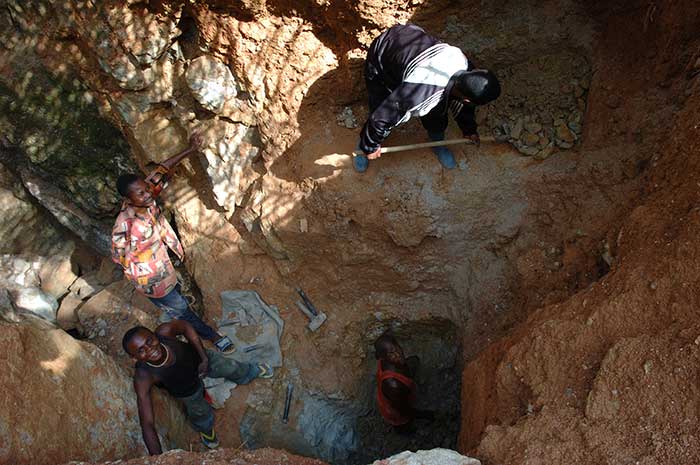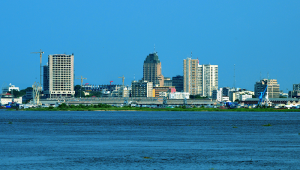web_mining_in_kailo2_drc.jpg

Gold miners in Democratic Republic of Congo
The report by Global Witness found the DRC had missed out on tax revenues on up to $38m worth of gold mined during a gold rush in a region of eastern Congo from 2013-15. Armed groups and bandits, a “predatory” Chinese-owned company, and corrupt elites harvested the country’s natural wealth instead, it stated.
Sophia Pickles, senior campaigner at Global Witness, highlighted that a nearby town, where at least 500 cases of malnutrition were documented in 2014, saw no benefits of the region’s gold boom.
The companies and provincial authorities involved “must all be held to account” for their actions, she said, adding that the Congolese government must enforce its own laws to ensure companies in its gold sector do not produce or trade gold that has funded armed groups.
The gold rush along the Ulindi River in Shabunda territory in eastern DRC generated more than a tonne of gold every year, worth around $38m, the report stated.
Global Witness claims to have uncovered collusion between armed groups, Chinese mining company Kun Hou Mining and local authorities that saw armed groups get paid, gold illegally smuggled out of the country, and mining authorities pocketing what little tax was officially collected.
The report accused Kun Hou Mining of paying armed groups and supplying them with weapons in order to secure access to rich gold deposits on the river bed.
The same armed group also regularly and unlawfully taxed workers dredging the river for the company, it continued, in collaboration with the area’s mining authority, SAESSCAM.
Kun Hou Mining also reportedly smuggled an estimated $17m worth of gold out of the country. In some cases, mining officials allegedly falsified export documents for the company. This obscured the gold’s origin – considered high risk by international standards – and falsely linked the gold to lawful operations, according to the report.
Any taxes that were collected by the local authorities appear to have “disappeared”, the report stated, while mining authorities supported Kun Hou Mining even amid requests from the national government to shut it down. The local authorities also failed to ensure the company was operated legally and in line with international standards from the OECD and United Nations.
The report highlighted that the gold has likely been smuggled on to the international market, via a host of other countries, to be used in jewellery or electronics, with buyers unable to ensure it is not connected to armed groups, conflict or human rights abuses.
“Provincial authorities overseeing Shabunda’s boom have, by their actions over the past two years, directly undermined international and national governments’ efforts to reform eastern Congo’s artisanal gold trade,” said Pickles.
The report stated that, as a result, “the gold boom left Shabunda town almost as it found it: a deprived enclave with no roads, running water or electricity and its people suffering grinding poverty.”
It also noted that this is “not an isolated case”, and alleged that semi-industrial, often Chinese-owned dredging companies have dodged taxes and smuggled gold over the border in other parts of eastern Congo.
“Hundreds of millions of dollars of artisanally produced gold from the country’s east – which may have fuelled human rights abuses and violence – ends up on global markets every year, often passing through transit countries such as Uganda, United Arab Emirates and Switzerland,” it said.
For its research, Global Witness interviewed over 80 people involved in the gold boom along the river in 2013, including gold divers, dredge workers, traders and business people, as well as local residents, authorities, members of civil society and a whistleblower from Kun Hou Mining.
John Tshonga, head of SAESSCAM in the province of South Kivu, where Shabunda Territory is located, denied the allegations and accused Global Witness of slandering SAESSCAM without providing any evidence.
He stressed that SAESSCAM has already responded directly to the allegations raised by Global Witness during a visit by one of its researchers to the SAESSCAM offices, where Tshonga said SAESSCAM provided “plausible explanations and evidence” to dispel the claims.
SAESSCAM has never collected taxes, only “compensatory fees in strict compliance with laws and regulations”, and has “never worked or collaborated with outlawed armed groups”, he said.
Tshonga argued that it seems Global Witness had a “predetermined goal” for their research from the outset and would not depart from that despite evidence to the contrary.
Kun Hou Mining is yet to respond to requests for comment.












